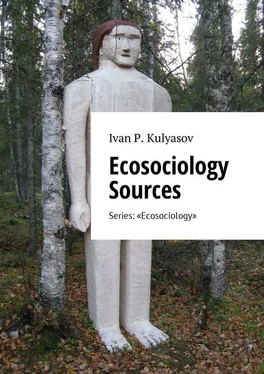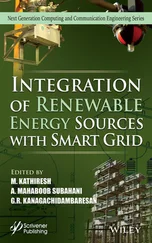I. Kulyasov - Ecosociology Sources. Series - «Ecosociology»
Здесь есть возможность читать онлайн «I. Kulyasov - Ecosociology Sources. Series - «Ecosociology»» — ознакомительный отрывок электронной книги совершенно бесплатно, а после прочтения отрывка купить полную версию. В некоторых случаях можно слушать аудио, скачать через торрент в формате fb2 и присутствует краткое содержание. ISBN: , Жанр: Прочая научная литература, на английском языке. Описание произведения, (предисловие) а так же отзывы посетителей доступны на портале библиотеки ЛибКат.
- Название:Ecosociology Sources. Series: «Ecosociology»
- Автор:
- Жанр:
- Год:неизвестен
- ISBN:9785449009913
- Рейтинг книги:5 / 5. Голосов: 1
-
Избранное:Добавить в избранное
- Отзывы:
-
Ваша оценка:
- 100
- 1
- 2
- 3
- 4
- 5
Ecosociology Sources. Series: «Ecosociology»: краткое содержание, описание и аннотация
Предлагаем к чтению аннотацию, описание, краткое содержание или предисловие (зависит от того, что написал сам автор книги «Ecosociology Sources. Series: «Ecosociology»»). Если вы не нашли необходимую информацию о книге — напишите в комментариях, мы постараемся отыскать её.
Ecosociology Sources. Series: «Ecosociology» — читать онлайн ознакомительный отрывок
Ниже представлен текст книги, разбитый по страницам. Система сохранения места последней прочитанной страницы, позволяет с удобством читать онлайн бесплатно книгу «Ecosociology Sources. Series: «Ecosociology»», без необходимости каждый раз заново искать на чём Вы остановились. Поставьте закладку, и сможете в любой момент перейти на страницу, на которой закончили чтение.
Интервал:
Закладка:
Ecosociology now included the notions of an ecological complex and an ecosystem, considering the natural environment as a factor influencing the behavior of humans and society. One might say that ecosociology analyzes interaction between the physical (natural) environment and society. To perceive all forms of interaction between humans / society and the natural environment, it was proposed that organizational forms of human collectives, their cultural values and composition had to be taken into account.
Therefore, the natural environment influences all stages of Park’s social evolution and elements of the ecological complex proposed by Duncan and Schnore – population, technology, culture, social system, and the individual. In this context, the basic questions posed by ecosociology were: How can different combinations of all the above elements influence the natural environment? And how can one ensure effective change in the natural environment when these elements are modified?
Foreign authors of environmental theories
An important issue in ecosociology related to rethinking of the notion “ environment ”. By this, traditional sociology meant the social environment while ecosociology primarily meant the natural or biophysical environment. This division took some time to be accepted by all sociologists.
In addition, ecosociology made an attempt to go beyond the vision of a symbolic or cognitive interaction between the man and the environment. Ecosociologists were trying to prove that the surrounding natural conditions – such as air and water pollution, waste generation, erosion and depletion of soil, spillages of oil and so on – in addition to a symbolic effect, have a direct, non-symbolic impact on human life and social processes. This meant that, besides the impact made by polluted air and urbanized landscape on people’s perception of the same, one had to take into account the influence of this factor on physical human health when studying social mobility, and mental health – when studying deviant behavior.
In the 1970s, according Franklin D. Wilson , the focus of attention of social ecology and ecosociology shifted to the following issues: interaction of humans and the artificial (“built”) environment; organizational, industrial, state responsibility for environmental issues; natural perils and catastrophes; assessment of environmental impact; impact from scarcity of natural resources; issues relating to deployment of scarce natural resources and carrying capacity of natural environment 33 33 Wilson F.D. Urban ecology: Urbanization and systems of cities // Annual Reviews Sociology. 1984. №10. p. 283—307.
.
Ecosociologists also noted the increasing influence of that part of public movement, which was showing concern over the state of natural environment and propagated such values as an environmentally friendly lifestyle and shaping a new ecological awareness, on social processes and institutes. These people were somewhat different from the environmental movement due to a greater emphasis on developing an ecological behavior and inner human potential (deep ecology). This difference is explained by the fact that these people were participants of other public movements and adherents of new religions rather than of the ecological movement per se.
Murray Bookchin (1921—2006), the main ideologist of ecoanarchism, studied social ecology-related issues, criticizing biocentric theories of deep ecologists and sociobiologists, as well as the followers of post-industrial ideas about the new epoch 34 34 Bookchin M. Ecology and revolutionary thought // Anarchy69. 1966. Vol. 6. p. 18—29.; Post scarcity anarchism. London: Wildwood House. 1971.; The ecology of freedom. The emergence and dissolution of hierarchy. Palo Alto CA, Cheshire Books. 1982.; Remaking society. Pathways to a green future. Boston: South end Press. 1990.
. He and other authors believed that a socio-ecological crisis was inevitable wherever state authority existed. All forms of governance are violence of man against man and nature.
In the opinion of ecoanarchists, a global ecological crisis could be prevented via decentralization of society and abandonment of large-scale industrial production. All people were to stop working for transnational corporations, move from metropolitan cities to small towns, rural municipalities, small communes and communities. Social relationships were to be regulated by methods of direct democracy and governed by direct right to life and natural resource use.
In the late 1990s, Bookchin refused to call himself an ecoanarchist, probably after seeing the implementation of his ideas in rural ecoanarchist communities and assuring himself that these ideas were inviable due to the impossibility of collective action and self-sufficiency, breakup and reverse migration to the cities caused by inequality and violence.
David Pepper , the ideologist of ecosocialism, and other authors were positive that the main causes of the socio-ecological crisis were the capitalist mode of production where society only exploited natural resources without producing them. In contrast with ecoanarchists, they suggested centralization of management (in the form of a state-controlled socialist economy), which was to help preserve nature as a universal human value 35 35 Pepper D. The roots of modern environmentalism. Croom Helm Australia. 1984.; Eco-socialism. From deep ecology to social justice. London: Rosefledge. 1993.
.
In the 1980s, these ideas were still popular but radical socio-ecological reforms were no longer associated with major social change. Instead, they were associated with internal change in the individual and society, a change in the system of values and attitude to nature. They proposed to renounce anthropocentrism and replace it with biocentrism.
Arne Dekke Eide Naess (1912—2009) and other authors promoted the idea of deep ecology, suggested distinctions between social and natural, holism instead of dualism, i.e., the unity of man and nature, society and the environment. Homo economicus was to make way for homo ecologicus, a bearer of ecological consciousness, which, in the transitional era of ecological crises and catastrophes, was to be cultivated and developed. After that, all artificial boundaries (ideological, state, religious, race, cultural, gender, biological) were expected to collapse, and a New Age would begin 36 36 Naess A. The shallow and the deep, long-range ecology movement: A summary // Inquiry. 1973. №16 (1). p. 95—100.
.
As already mentioned above, ecosociologists also responded to the ongoing social change, proposing the new ecological paradigm, under which the paradigm of human exceptionalism would be replaced by that of human emancipation. These ideas were extremely popular among younger people and public movements addressing the issues relating to the quality of life. The power, industrial and financial elites could propose no viable alternative. Children saw no future in the activities of their parents. Society was afraid that it was edging towards a catastrophe and extinction. This situation could not last for a sufficiently long time and an intellectual breakthrough was needed.
The publication of expert’s works on limits of economic growth and the World Commission on Environment and Development report “ Our common future ” in the late 1980s gave rise to the popularity of the sustainable development theory, which will be considered in more detail in the chapter “ Theories of sustainable development ”.
Unlike ecoanarchists and ecosocialists, Albert Arnold Gore , one of ideologists of “green” capitalism, and other authors believed that industrial production, based on competition and profit generation, could be ecologized through state regulation and formation of new “green” markets. This did not make any changes in social relationships, but modernize them. This was to happen gradually and naturally as ecological challenges emerged, which were to be responded via new norms and rules for activities, behavior, morals and culture 37 37 Gore A. Earth in the balance. Forging a new common purpose. London: Earthcan Publications. 1992.
.
Интервал:
Закладка:
Похожие книги на «Ecosociology Sources. Series: «Ecosociology»»
Представляем Вашему вниманию похожие книги на «Ecosociology Sources. Series: «Ecosociology»» списком для выбора. Мы отобрали схожую по названию и смыслу литературу в надежде предоставить читателям больше вариантов отыскать новые, интересные, ещё непрочитанные произведения.
Обсуждение, отзывы о книге «Ecosociology Sources. Series: «Ecosociology»» и просто собственные мнения читателей. Оставьте ваши комментарии, напишите, что Вы думаете о произведении, его смысле или главных героях. Укажите что конкретно понравилось, а что нет, и почему Вы так считаете.




![Джеймс Купер - Пионеры, или У истоков Саскуиханны [The Pioneers, or The sources of the Susquehannah]](/books/395797/dzhejms-kuper-pionery-ili-u-istokov-saskuihanny-t-thumb.webp)







